Take care of your blinds before putting them away at the end of turkey season to increase their useful lifespan by years
We just wrapped up another successful turkey season here in central Kentucky. Most of the properties we hunt in this area are small, 40-60 acres on average, and that makes running and gunning style turkey hunts tough at best. One wrong step and you can blow the birds completely off the property for days.
Instead, we pop up several ground blinds in areas we know turkeys like to use and rotate from blind to blind all season. With that many ground blinds out, it’s inevitable that we run into some repair issues from time to time, but giving your blinds a healthy dose of preventive maintenance before storing them at the end of the season ensures they will be ready to go and in good shape next spring. Here’s our end-of-season checklist to keep our blinds ready to go.
Patch the Holes
Sticks and limbs, the occasional errant broadhead, barb wire fences in a wind storm… getting a rip or hole in a blind is going to happen. And small holes soon turn into large ones if you don’t repair them. If your blind material is heavy enough, you can use needle and thread to sew any rips or tears. I’m not that handy with a needle, so I usually go an easier route: duct tape.
My preferred patching method consists of a two-layer plan of attack. I use Duck Brand tape in Realtree Extra for the exterior, then a black tape on the inside. The tapes stick to the blind material surprisingly well and the double layer sticks together over the open hole. I have patches on blinds made in this manner that have lasted for several seasons now.
If you have a large tear, you can find super strong large adhesive patches, normally in black, that will cover even major rips and prevent them from getting larger.
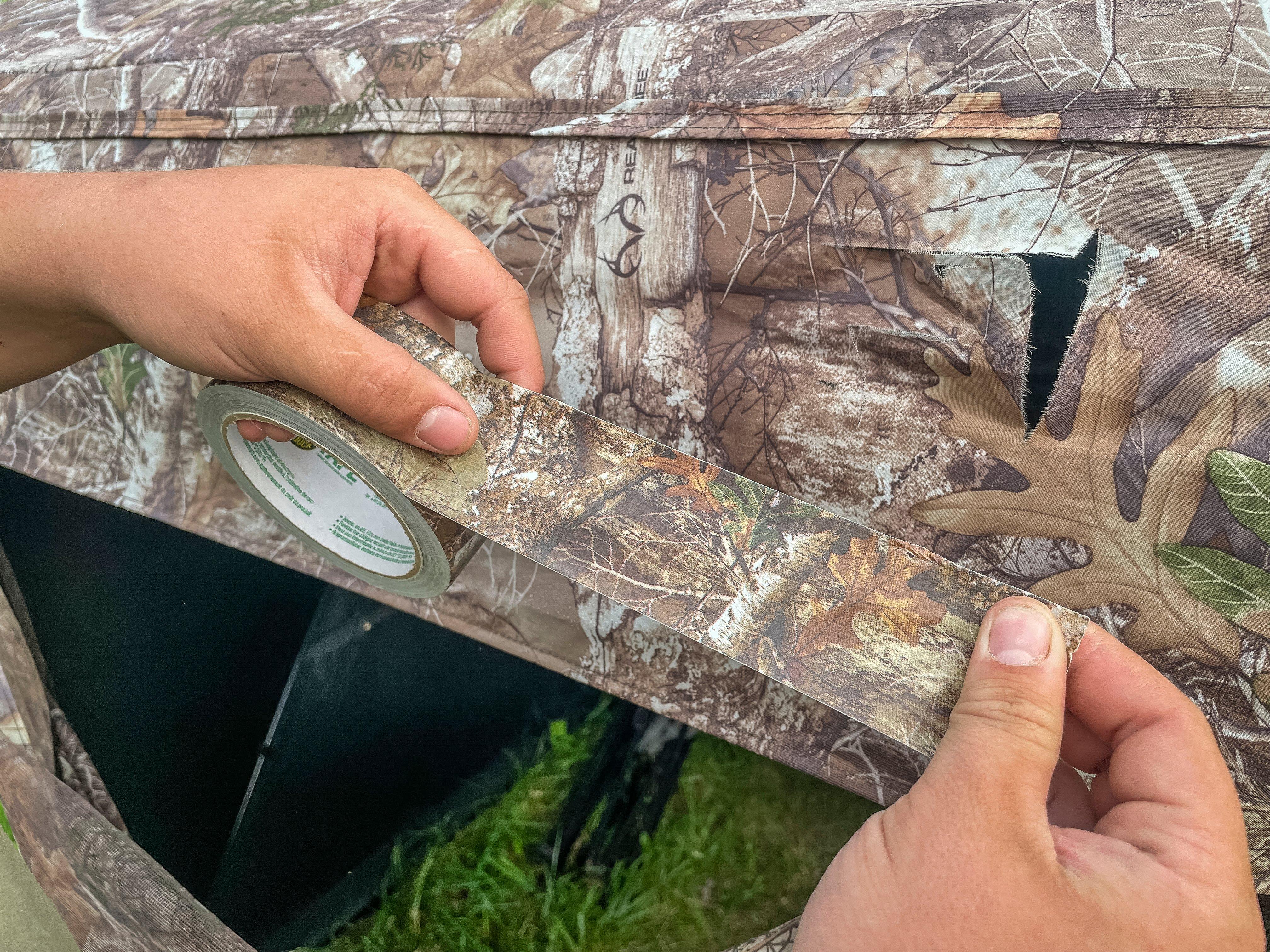
A simple patch for the occasional hole or tear in your blind is a double layer of Realtree camp duct tape. Image by Michael Pendley
Replace Broken Hubs or Rods
Most modern blinds are built on a folding fiberglass hub-style frame. The fiberglass skeleton of these frames can sometimes get busted or damaged in a wind event or even from binding while folding or unfolding the blind. Most manufacturers sell replacement poles. You can also keep the hubs and poles from older, discarded blinds and reuse them for repairs when needed. The repair technique will vary by manufacturer. Some blinds have individual removable rods that can be replaced as needed. Others have rods that are permanently mounted to a hub, meaning you have to replace the entire side with hub and all four rods.
If you notice one of the fiberglass rods on your blind is starting to separate and splinter, you can sometimes stretch it an extra season or two by wrapping the damaged area tightly with tape. The tape also prevents painful fiberglass splinters if you happen to brush bare skin against the damaged area.
(Don’t Miss: HOW TO BOWHUNT TURKEYS FROM A GROUND BLIND)
Empty the Trash
I don’t like to be hungry while I’m hunting, so I almost always have a snack or two in my turkey vest. By the end of season, the storage pockets on the inside of our blinds are stuffed full of ziplocks that once held venison jerky, empty peanut M&M bags, tissues, and other debris. Trust me when I say you don’t want to leave a blind in storage only to find this stuff the following spring. Go ahead and clean them out before you take them down for the season.
Keep Your Zippers Zipping
For blinds with zippered doors and windows, it's important that they work when you need them, and that they open and close easily and quietly. There’s nothing worse than needing to exit a blind in a hurry to go put your boot on a big longbeard’s neck only to find a stuck door. Keep yours working smoothly by giving them a light spray inside and out with a silicone spray lubricant. The silicone works in any temperature, is water resistant, and will still be slick when you need the blinds next season.
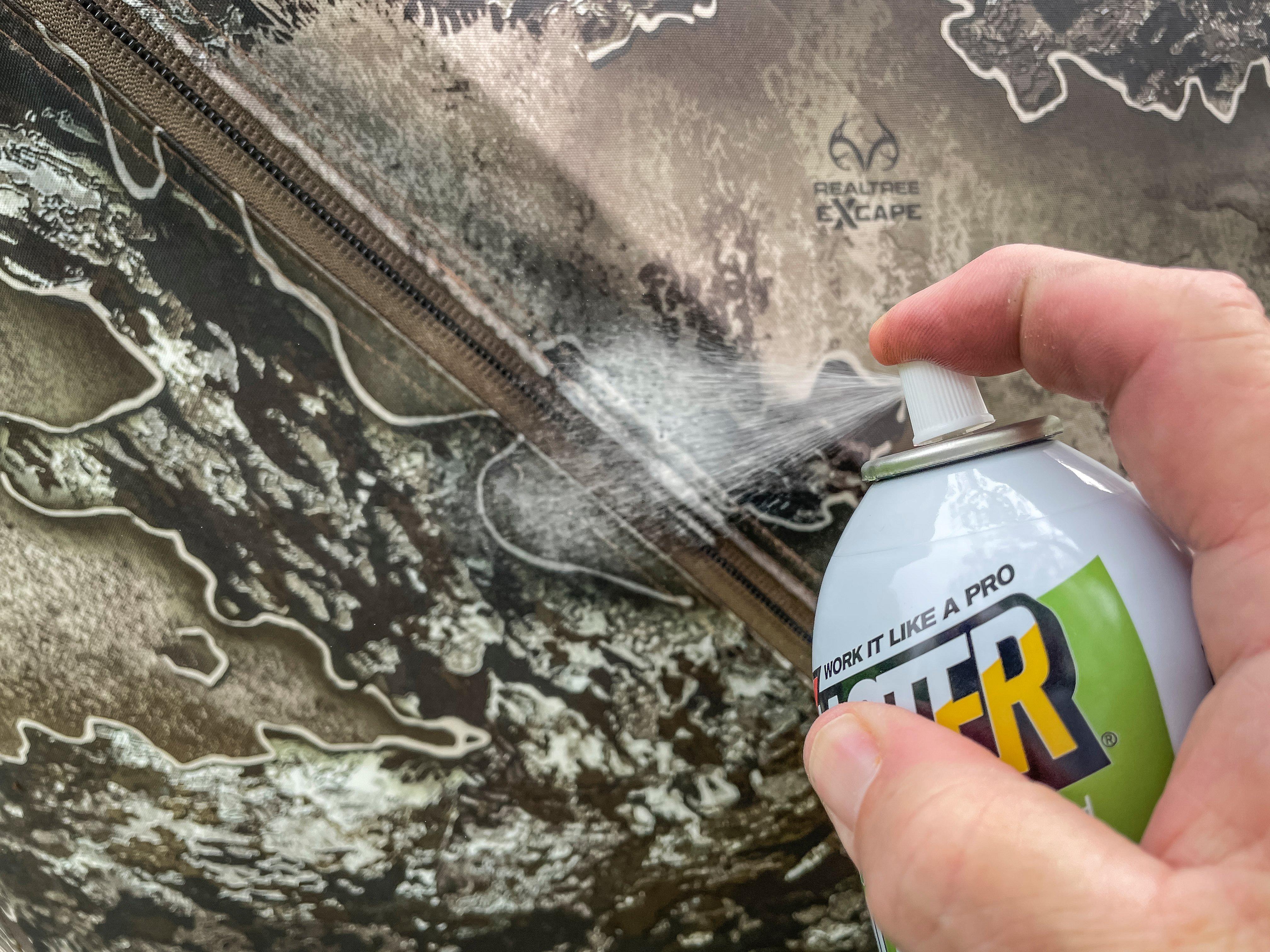
Spray zippers with silicone lubricant to keep them working smoothly and quietly. Image by Michael Pendley
Replace the Factory Spikes
Modern blinds are head and shoulders higher quality than the first pop up style blinds to hit the market all those years ago. But even though frame design, blind material, window construction, and the like have undergone massive improvements, most blind manufacturers still include those small wire pegs to hold them down. Anyone who’s ever left a blind in the field for most of turkey season knows that it doesn’t take much wind to pull those tiny stakes out of the ground and send your blind tumbling toward the closest barbed-wire fence. Do yourself a favor and replace those stakes with heavy tent pegs with wide tops. They can be found in most large sporting goods stores for under a dollar each — a small price to pay to protect and hold your expensive blind in place, no matter the weather.
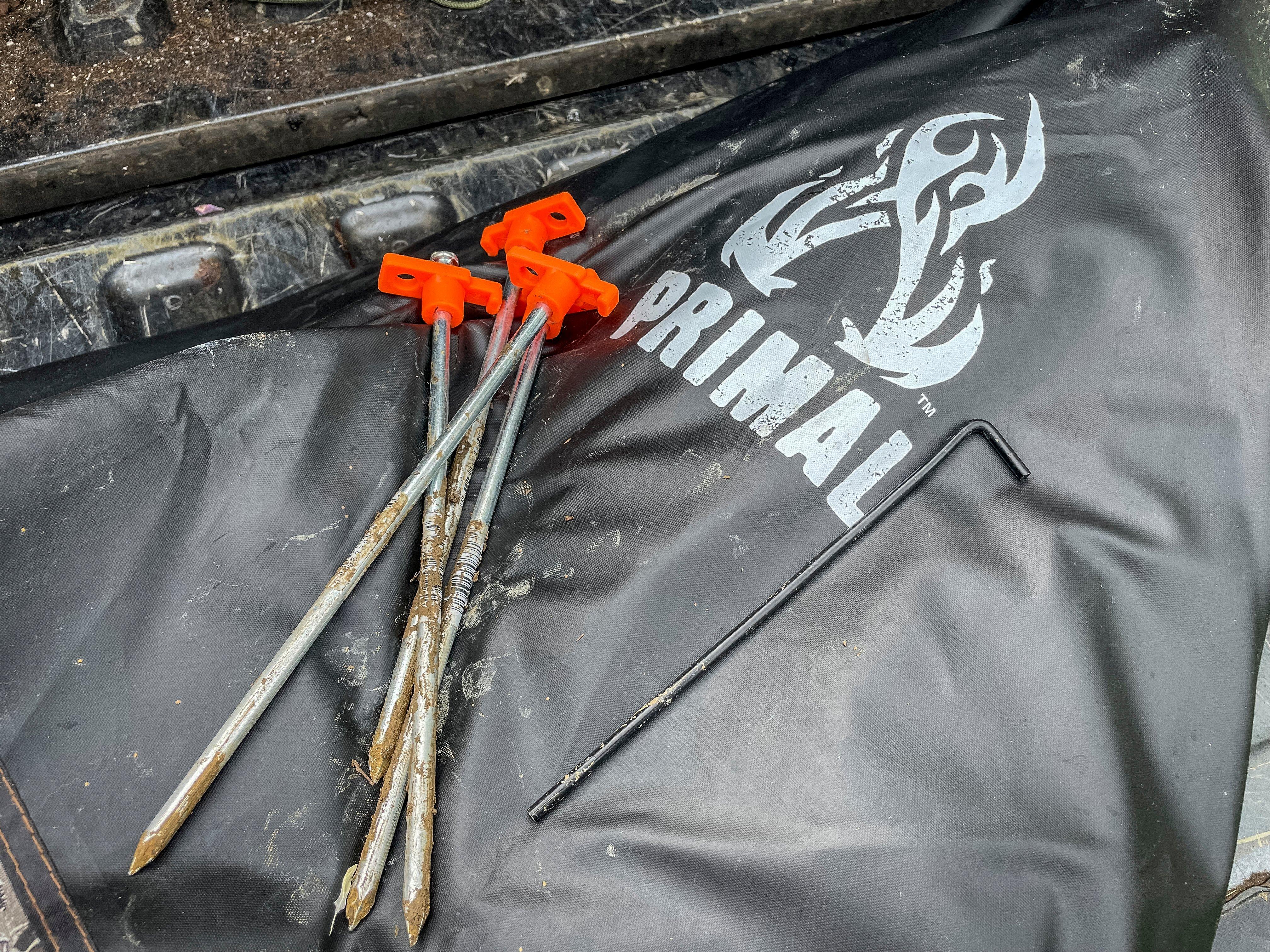
Replace the factory spikes with longer, heavier tent pegs to keep the blind in place even in windy conditions. Image by Michael Pendley
Replace Missing and Broken Tie Down Strings
Most modern hub-style blinds are designed to be staked down on the corners of the blind itself and secured by tie-down lines that extend out from each hub. If your blind has a worn, broken, or missing tie-down string, 550 paracord in black or olive green is the perfect replacement.
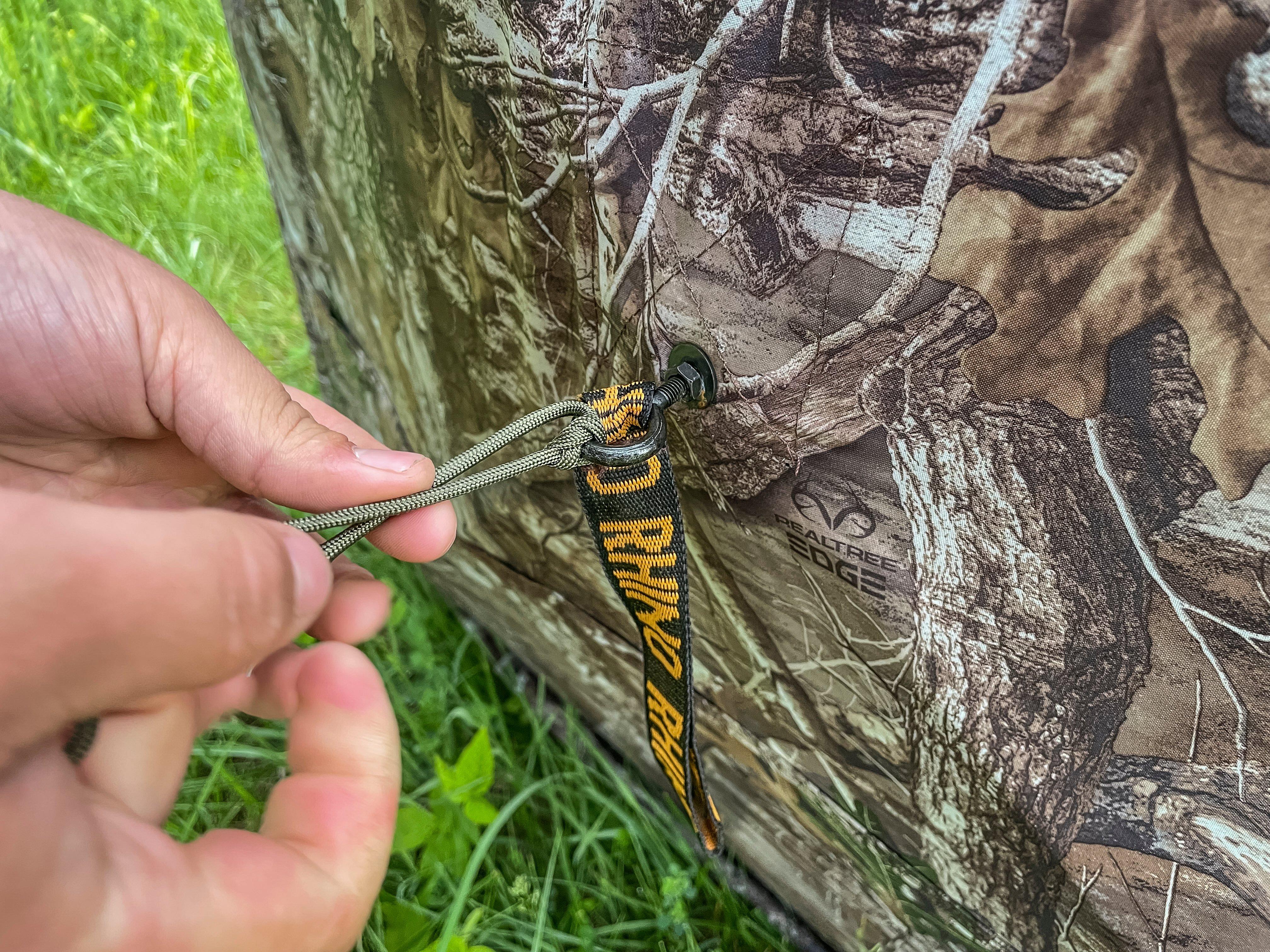
Paracord is a strong and inexpensive replacement for missing or broken tie down strings. Image by Michael Pendley
Keep the Pests at Bay
We store our ground blinds in a barn over the off season. That means critters and pests like ants, wasps, and mice tend to find their way in and make a home. To slow down insect infestations, we mix concentrated permethrin spray designed for insect control in stables in a spray bottle and soak the blind before putting it away for the season. As a wild game cook by trade, the thought of tick borne alpha gal syndrome causing me to not be able to eat meat scares the living hell out of me. I usually keep a small sprayer of the same mixture with me when putting the blinds out each spring. Just spray the blind’s sides, both inside and out, as well as the ground around and inside each blind. One or two applications will last an entire season and keep ticks and ants away.
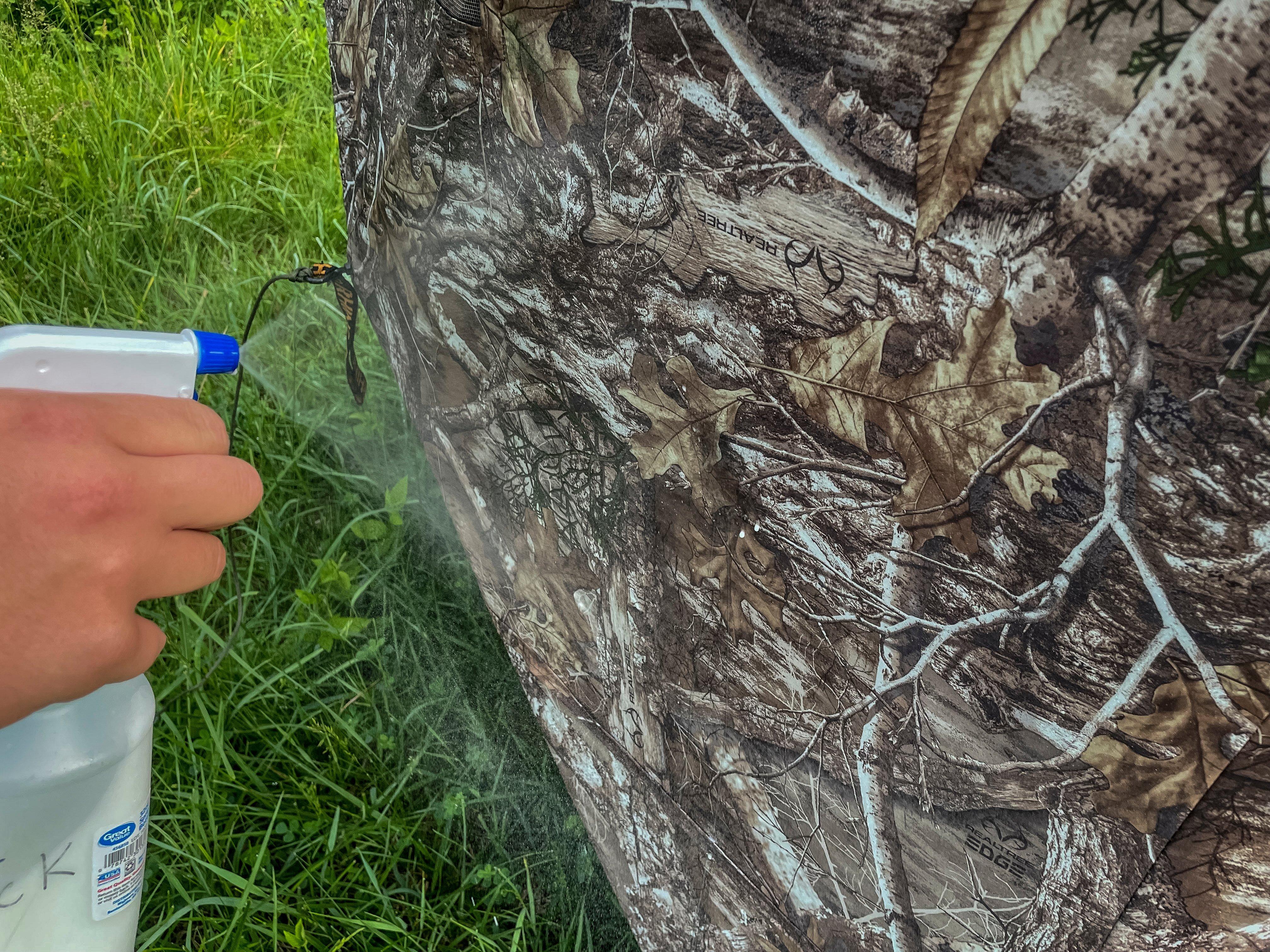
Keep ticks and other insects away with an application of permethrin insecticide when installing and before storing blinds. Image by Michael Pendley
For years, we would occasionally find a mouse nest or evidence of mice in our stored blinds. The vermin would chew holes through the material and generally make a mess. These days, we add a few drops of peppermint or lemon grass oil to the blind when we store it. I’ve also heard that cinnamon, citronella, or cayenne pepper sprinkled over the blind will help keep mice away.
Good hunting blinds are an investment. Putting in a little time at the end of each season will make that investment last for years to come and save you some serious money. And that’s money that can be spent to buy even more hunting supplies for next season.










